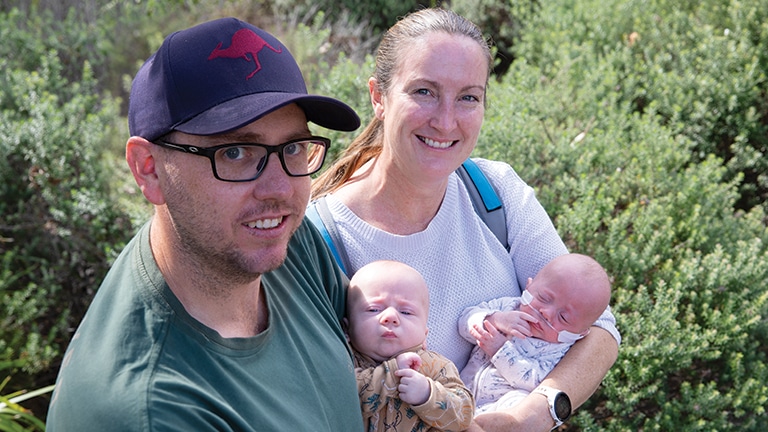
On 15 July 2021, weighing in at just 900gms and one kilogram, twin boys Michael and Ollie North became the first babies to be born into the NEW1000 family study.

On 15 July 2021, weighing in at just 900gms and one kilogram, twin boys Michael and Ollie North became the first babies to be born into the NEW1000 family study.
The study aims to recruit 1,000 babies and their families over 10 years to understand how the first 1,000 days of a child’s life impacts their health and wellbeing into adulthood.
While waiting for her 12-week ultrasound at the hospital, Alannah was invited to participate in the study. She welcomed the opportunity with open arms.
“Ever since I was young, I’ve been extremely interested in health,” she explains. “I come from an active, sporty family, so looking after yourself and your health has always been part of my way of life. It’s this kind of research that goes towards really positive outcomes and can help people in the future.”
At her 27-week scan, fetal growth restriction (FGR) was detected in the unborn twins. And just a week later, Michael and Ollie were born at 28 weeks gestation and placed in the John Hunter Hospital’s Neonatal Intensive Care Unit.
Across the next three months, Alannah and Nathan visited the boys daily until finally, they were big enough and strong enough to be carefully swaddled and driven home.
Like many very premature babies, both Michael and Ollie were born with a hole in the heart and while Michael’s closed using medication, Ollie’s required surgery in Sydney.
“I thought being a paramedic who does a lot of shift work would have helped me with the lack of sleep,” Alannah laughs. “But nothing could have prepared me for this. Being a mum is the hardest job I’ve ever had!”
NEW1000 researchers are studying the early origins of many health issues. One study relates to the microorganisms (collectively known as the microbiome) that live on and inside us and play a central role in health and disease.
Researchers will investigate the role of the microbiome in the developmental origins of health and disease. Samples are being collected from parents to see how their microbiome profiles influence their child’s.
“Being part of the NEW1000 study has been effortless. I didn’t need to make any changes in my day-to-day life to be a part of the research process,” Alannah states. “It’s not invasive, and there’s been no issue for the boys.”
“Years ago, my children may not have had stood a chance being born at just 28 weeks. The technology that has helped my kids be here today has come out of the trial and error of past research. If being a part of a study can benefit the community and make a difference to other lives down the track, why wouldn’t you do something?”
To participate or learn more about the NEW1000 family study visit new1000.org.au